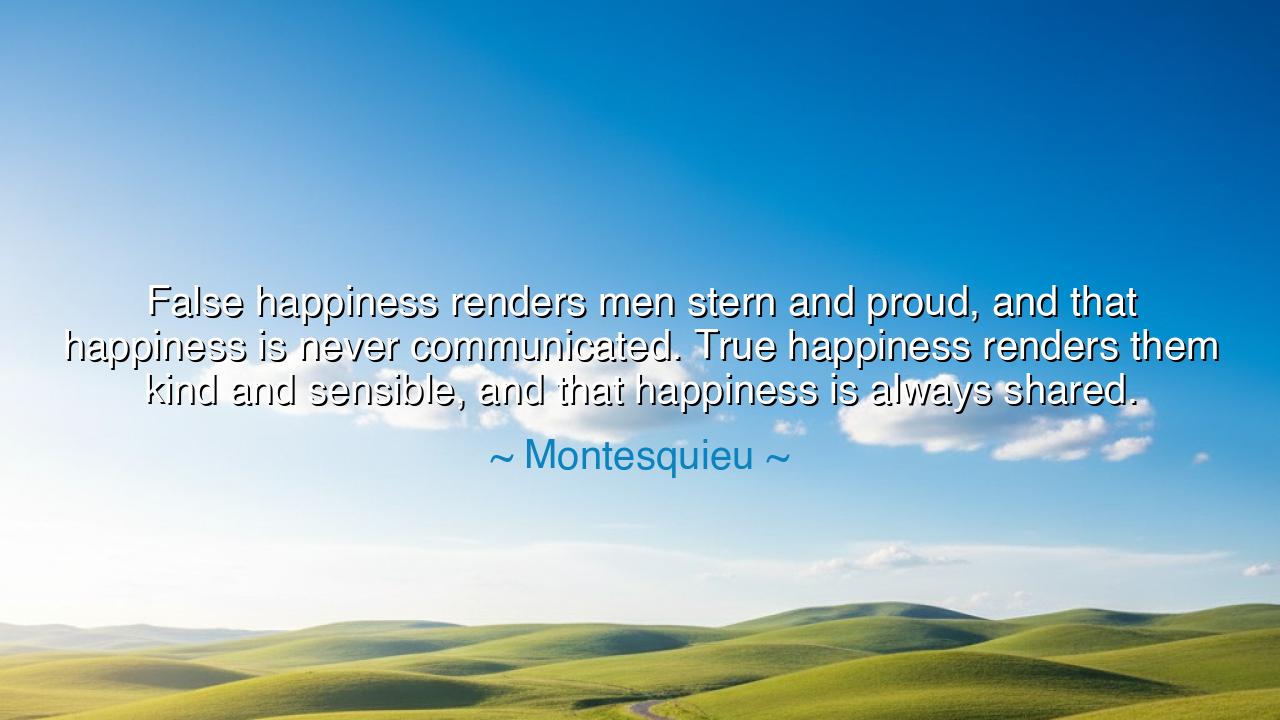
False happiness renders men stern and proud, and that happiness
False happiness renders men stern and proud, and that happiness is never communicated. True happiness renders them kind and sensible, and that happiness is always shared.






“False happiness renders men stern and proud, and that happiness is never communicated. True happiness renders them kind and sensible, and that happiness is always shared.” — Thus wrote Montesquieu, the philosopher of reason and virtue, whose insight into the human heart remains as fresh today as in the age of kings and revolutions. His words strike at the very root of human illusion — the difference between false happiness, which isolates the soul, and true happiness, which unites it with others. In these few lines, he gives us a mirror to see ourselves more clearly: to discern whether our joy is shallow and self-serving, or deep and radiant, flowing outward to those around us.
Montesquieu lived in the eighteenth century, a time when Europe was awakening to new ideas of liberty, equality, and the dignity of the individual. Amid the splendor of courts and the corruption of power, he observed that those who claimed to be happy — the nobles, the wealthy, the proud — often lived in cold detachment, guarded by their vanity. Their happiness was brittle, a fragile armor made of luxury and pride. It could not be shared, for it was not real. It was the happiness of appearance, not of essence. Such men were stern, because they feared to lose their illusion, and proud, because their joy depended on being above others. Thus, their happiness was a wall, not a bridge.
False happiness, Montesquieu tells us, is born of the ego — the endless striving for recognition, wealth, and superiority. It feeds on comparison and dies in solitude. The man who seeks happiness only for himself becomes a prisoner of his own success. He cannot share his joy, for it is rooted in the desire to be envied, not loved. And envy cannot unite — it divides. His laughter rings hollow, his generosity is calculated, and his heart, though full of possessions, is empty of peace. Such a person may appear radiant, but like gold-leaf over stone, his brightness conceals hardness beneath.
In contrast, true happiness springs from humility, love, and harmony. It is the joy that flows from a heart at peace with itself and the world. This kind of happiness cannot be contained; it radiates naturally, like sunlight. The truly happy are not proud, for they no longer need to prove their worth. They are kind, for happiness softens the heart; and sensible, for happiness clears the mind. This joy is not a possession to be hoarded, but a song to be sung together. It multiplies by being shared, and the more it is given, the more it grows. The wise have always known this truth — that happiness divided among many does not diminish, but deepens.
Consider the example of Mother Teresa, who lived among the poorest of Calcutta. She had no riches, no power, no luxury, yet she carried a light that uplifted the broken and comforted the dying. Her happiness was not the laughter of ease, but the serenity of love. She found joy not in receiving, but in giving; not in triumph, but in service. The world looked upon her and saw that true happiness is never selfish. It dwells not in the palaces of the proud, but in the hearts of those who love freely. And this joy, because it is real, is communicated — it moves from soul to soul like a flame passed from one candle to another, lighting the world without losing its own fire.
Montesquieu’s wisdom thus reveals a great paradox: that the more one seeks happiness for oneself, the more it slips away; and the more one seeks it for others, the more it returns a hundredfold. The proud build towers to guard their joy and find themselves imprisoned in them; the humble open their doors and find the world entering with warmth.






AAdministratorAdministrator
Welcome, honored guests. Please leave a comment, we will respond soon